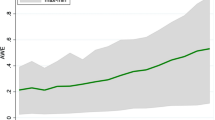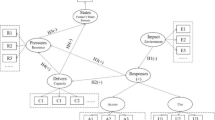Abstract
Lower irrigation efficiency and energy poverty cast a pall on the prospects for sustainable development. However, their relationship is poorly understood, particularly in rural China. Using the China Family Panel Studies 2014–2018 waves, this study examines the impact of energy poverty (EP) on irrigation water efficiency (IWE). Result show that EP reduced IWE by 28.3 ~ 42.4%. These results are robust to a variety of estimation methods. The underlying mechanisms, as revealed by structural equation modeling, are that health and non-agricultural employment act as mediators of the EP-IWE relationship. Non-agricultural employment has a positive and statistically significant mediating effect, indicating that efforts to alleviate energy poverty are partially transmitted to IWE.



Similar content being viewed by others
Data availability
All relevant data will be available on request from the corresponding author or available from online: http://www.isss.pku.edu.cn/cfps/download.
Code availability
The software code used in this research will be available on request from the corresponding author.
References
Ahmad A, Khan S (2017) Water and energy scarcity for agriculture: is irrigation modernization the answer? Irrig Drain 66(1):34–44. https://doi.org/10.1002/ird.2021
Andadari RK, Mulder P, Rietveld P (2014) Energy poverty reduction by fuel switching. Impact evaluation of the LPG conversion program in Indonesia. Energy Policy 66:436–449
Awaworyi Churchill S, Munyanyi ME, Smyth R, Trinh TA (2021) Early life shocks and entrepreneurship: evidence from the Vietnam War. J Bus Res 124:506–518
Boardman B (1991) Fuel poverty from cold homes to affordable warmth.
Bukari C, Broermann S, Okai D (2021) Energy poverty and health expenditure: evidence from Ghana. Energy Econ 103(1):105565
Casillas CE, Kammen DM (2010) The energy-poverty-climate nexus. Science 330(6008):1181–1182
Charlier D, Legendre B (2019) A multidimensional approach to measuring fuel poverty. Energy J 40(2):27–53
Cheng Z, Tani M, Wang H (2021) Energy poverty and entrepreneurship. Energy Econ 102:105469
David D, Glen T, Catherine W (2021) Energy poverty indicators: inconsistencies, implications and where next? Energy Econ 103:105551
Deng X, Xu D, Qi Y, Miao Z (2018) Labor off-farm employment and cropland abandonment in rural china: spatial distribution and empirical analysis. Int J Environ Res Public Health 15(9):1808–1824
Dercon S, Sánchez A (2013) Height in mid childhood and psychosocial competencies in late childhood: evidence from four developing countries. Econ Hum Biol 11(4):426–432
Doğanalp N, Ozsolak B, Aslan A (2021) The effects of energy poverty on economic growth: a panel data analysis for BRICS countries. Environ Sci Pollut Res 28:50167–50178. https://doi.org/10.1007/s11356-021-14185-x
Gafa DW, Egbendewe AYG (2021) Energy poverty in rural West Africa and its determinants: evidence from Senegal and Togo. Energy Policy 156:0301–4215
Gao J, Strijker D, Song G, Li SP (2018) Drivers behind farmers’ willingness to terminate arable land use contracts. Tijdschr Voor Econ En Soc Geogr 109:73–86
Gates B (2022) How to Avoid a Climate Disaster: The Solutions We Have and the Breakthroughs We Need. Vintage
Gkiza IG, Nastis SA, Park T, Vukina T, Sheldon I (2017) Health and women’s role in agricultural production efficiency. Appl Econ Perspect Policy 39(3):428–440
González-Eguino M (2015) Energy poverty: an overview. Renew Sust Energ Rev 47:377–385. https://doi.org/10.1016/j.rser.2015.03.013
Hills J (2012) Getting the measure of fuel poverty: final report of the fuel poverty review. The London School of Economics and Political Science, London
Howard LL (2011) Does food insecurity at home affect non-cognitive performance at school? A longitudinal analysis of elementary student classroom behavior. Econ Educ Rev 30(1):157–176
Huang Q, Wang J, Li Y (2017) Do water saving technologies save water? empirical evidence from north china. J Environ Econ Manag 82(MAR.):1–16
Huang Q, Wang L, Cui M, Yang L (2019) Does aging and off-farm employment hinder farmers’ adoption behavior of soil and water conservation technology in the Loess Plateau? Int J Clim Change Strat Manag 12(1):92–107
Huang X, Wu B (2020) Impact of urban-rural health insurance integration on health care: evidence from rural china. China Econ Rev 64:101543
Kahouli S (2020) An economic approach to the study of the relationship between housing hazards and health: the case of residential fuel poverty in France. Energy Econ 85:104592. https://doi.org/10.1016/j.eneco.2019.104592
Kaygusuz K (2011) Energy services and energy poverty for sustainable rural development. Renew Sustain Energy Rev 15(2):1364–321. https://doi.org/10.1016/j.rser.2010.11.003
Li M, Fu Q, Singh V, Liu D, Li T, Zhou Y (2020) Managing agricultural water and land resources with tradeoff between economic, environmental, and social considerations: a multi-objective non-linear optimization model under uncertainty. Agric Syst 178:102685
Lin B, Wang Y (2020) Does energy poverty really exist in China? From the perspective of residential electricity consumption. Energy Policy 143:111557
Lin B, Zhao H (2021) Does off-farm work reduce energy poverty? evidence from rural china. Sustain Prod Consum 27(2):1822–1829. https://doi.org/10.1016/j.spc.2021.04.023
Liu C, Zhang W (2015) Empirical study of the farmers’ health status’ effects on agricultural efficiency. Oper Res Manag Sci 24(2):281–287
Liu W, Xia Y, Hou J (2019) Health expenditure efficiency in rural china using the super-SBM model and the Malmquist productivity index. Int J Equity Health 18(1):111
Liu Y, Chen Y, Long H (2010) The process and driving forces of rural hollowing in China under rapid urbanization. J Geogr Sci 20(6):876–888
Long H, Li Y, Liu Y, Woods M, Zou J (2012) Accelerated restructuring in rural China fueled by ‘increasing vs. Decreasing balance’land-use policy for dealing with hollowed villages. Land Use Policy 29(1):11–22
Loureiro ML (2009) Farmers’ health and agricultural productivity. Agric Econ 40(4):381–388
Mahmood N, Arshad M, Kächele H, Ullah A, Müller K (2020) Economic efficiency of rainfed wheat farmers under changing climate: evidence from Pakistan. Environ Sci Pollut Res 27:34453–34467. https://doi.org/10.1007/s11356-020-09673-5
Mani A, Mullainathan S, Shafir E, Zhao J (2013) Poverty impedes cognitive function. Science 341(6149):976–980
Min S (2016) The reduction of cotton cultivation in Shandong province of china: does off-farm employment matter? China Agric Econ Rev 9(4):607–622
Moore R (2012) Definitions of fuel poverty: implications for policy. Energy Policy 49:19–26
Namara RE, Hanjra MA, Castillo GE, Ravnborg HM, Smith L, Koppen BV (2010) Agricultural water management and poverty linkages. Agric Water Manag 97(4):520–527
Nawaz S (2021) Energy poverty, climate shocks, and health deprivations. Energy Econ 100:105338
NBSC (National Bureau of Statistics in China) (2018) China Statistical Yearbook. China Statistics Press, Beijing
Olopade BC, Okodua H, Oladosun M, Asaleye AJ (2019) Human capital and poverty reduction in opec member-countries. Heliyon 5(8):e02279
Ozturk I (2017) The dynamic relationship between agricultural sustainability and food-energy-water poverty in a panel of selected Sub-Saharan African Countries. Energy Policy 107:289–299. https://doi.org/10.1016/j.enpol.2017.04.048
Pan L, Biru A, Lettu S (2021) Energy poverty and public health: global evidence. Energy Econ 101:105423
Patil S, Kenia N, Gunatilake H (2021) Divide and prosper? impacts of power-distribution feeder separation on household energy-use, irrigation, and crop production. Energy Policy 156:112427
Peng N, Alfonso SP, Xue J (2016) Fuel for life: domestic cooking fuels and women’s health in rural China. Int J Environ Res Public Health 13(8):810
Qiu G, Zhang X, Yu X, Zou Z (2018) The increasing effects in energy and GHG emission caused by groundwater level declines in north China’s main food production plain. Agric Water Manag 203:138–150
Rafi M, Naseef M, Prasad S (2021) Multidimensional energy poverty and human capital development: empirical evidence from India. Energy Econ 101:105427
Sánchez A (2017) The structural relationship between early nutrition, cognitive skills and non-cognitive skills in four developing countries. Econ Hum Biol 27:33–54
Shi H, Xu H, Gao W, Zhang J, Chang M (2022) The impact of energy poverty on agricultural productivity: The case of China. Energy Policy 167:113020. https://doi.org/10.1016/j.enpol.2022.113020
Schermelleh-Engel K, Moosbrugger H, Müller H (2003) Evaluating the fit of structural equation models: tests of significance and descriptive goodness-of-fit measures. Methods Psychol Res 8(2):23–74
Schick A, Steckel RH (2010) Height as a proxy for cognitive and non-cognitive ability. In: National Bureau of Economic Research Working Paper No. 16570
Su Y, Araral E, Wang Y (2020) The effects of farmland use rights trading and labor outmigration on the governance of the irrigation commons: evidence from China. Land Use Policy 91:104378
Tang J, Folmer H, Xue J (2015) Technical and allocative efficiency of irrigation water use in the guanzhong plain, China. Food Policy 50:43–52
Tilai A, Brahmana R, Hui W (2021) Does nutrition really matter for the productivity of smallholder farmers? Pertanika J Soc Sci Humanit 29(2):1125–1150
Topak R, Acar B, Ugurlu N (2009) Analysis of energy use and input costs for irrigation in field crop production: a case study for the konya plain of turkey. J Sustain Agric 33(7):757–771
United Nations (2020) The United Nations world water development report 2020: water and climate change. UNESCO World Water Assessment Programme
United Nations (2021) The Sustainable Development Goals Report
Wang J, Jiang Y, Wang H, Huang Q, Deng H (2019) Groundwater irrigation and management in northern China: status, trends, and challenges. Int J Water Resour Dev 36(4):670–696
Wang J, Zhu Y, Sun T, Huang J, Zhang L, Guan B (2020a) Forty years of irrigation development and reform in China. Aust J Agric Resour Econ 64(1):126–149
Wang X, Huang J, Rozelle S (2017) Off-farm employment and agricultural specialization in China. China Econ Rev 42:155–165
Wang Y, Chen C, Araral E (2016) The effects of migration on collective action in the commons: evidence from rural China. World Dev 88:79–93
Wang Y, Zang L, Araral E (2020b) The impacts of land fragmentation on irrigation collective action: empirical test of the social-ecological system framework in China. J Rural Stud 78(3):234–244
Wuepper D, Lybbert TJ (2017) Perceived self-efficacy, poverty, and economic development. Ann Rev Resour Econ 9:383–404
Yang J, Wang H, Jin S, Chen K, Riedinger J, Peng C (2016) Migration, local off-farm employment, and agricultural production efficiency: evidence from China. J Prod Anal 45(3):247–259
Zhang D, Li J, Han P (2019) A multidimensional measure of energy poverty in China and its impacts on health: an empirical study based on the china family panel studies. Energy Policy 131(AUG.):72–81
Zhang L, Su W, Eriksson T, Liu C (2016) How off-farm employment affects technical efficiency of China’s farms: the case of Jiangsu. Chin World Econ 24(3):37–51
Zhang S, Wang Y, Hao Y, Liu Z (2021) Shooting two hawks with one arrow: could China’s emission trading scheme promote green development efficiency and regional carbon equality? Energy Econ 101:105412
Zhao Q, Bao HX, Zhang Z (2020) Off-farm employment and agricultural land use efficiency in China. Land Use Policy 101:105097
Zhou Y, Shi X, Heerink N, Ma X (2019) The effect of land tenure governance on technical efficiency: evidence from three provinces in eastern China. Appl Econ 51(22):2337–2354
Zhou Y, Guo Y, Liu Y (2020) Health, income and poverty: evidence from China’s rural household survey. Int J Equity Health 19(1):1–12
Funding
Not applicable.
Author information
Authors and Affiliations
Contributions
Conceptualization: Hongxu Shi; data curation: Hongxu Shi, Wei Gao, Hao Xu, and Ming Chang; formal analysis: Hongxu Shi, Wei Gao, and Hao Xu; methodology: Hongxu Shi, Hao Xu, and Ming Chang; software: Hongxu Shi, Hao Xu, and Ming Chang; writing—original draft: Hongxu Shi; writing—review and editing: Hongxu Shi, Wei Gao, Hao Xu, and Ming Chang.
Corresponding author
Ethics declarations
Ethics approval
This manuscript does not require ethical approval.
Consent to participate
No volunteers or animals were involved in the study.
Consent to publication
This manuscript will be published if accepted.
Competing interests
The authors declare no competing interests.
Additional information
Responsible Editor: Philippe Garrigues
Publisher's note
Springer Nature remains neutral with regard to jurisdictional claims in published maps and institutional affiliations.
Rights and permissions
About this article
Cite this article
Shi, H., Gao, W., Xu, H. et al. Understanding the mechanism of energy poverty affecting irrigation efficiency: evidence from rural China. Environ Sci Pollut Res 29, 70963–70975 (2022). https://doi.org/10.1007/s11356-022-20874-y
Received:
Accepted:
Published:
Issue Date:
DOI: https://doi.org/10.1007/s11356-022-20874-y




